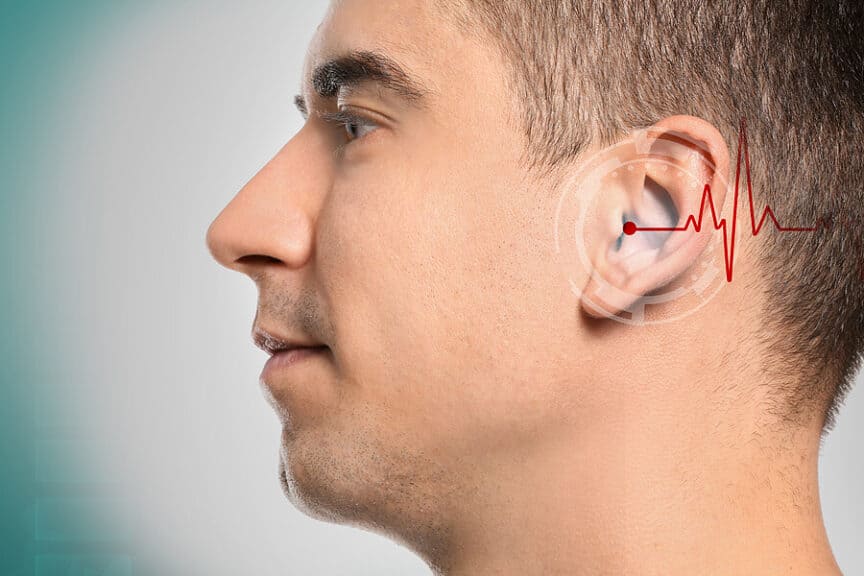Tinnitus, often described as a persistent ringing, buzzing, or hissing sound in the ears, affects millions of individuals worldwide. As leading audiologists, our commitment to advancing hearing healthcare drives us to explore the latest research, diagnostics, and interventions for tinnitus. This article will look at the evolving landscape of tinnitus, discussing prevention, diagnosis, management strategies, and the vital role of early detection.
Prevention: Safeguarding Hearing Health
Preventing tinnitus begins with safeguarding our hearing health. Exposure to excessive noise is a common contributor to tinnitus, underscoring the importance of using ear protection in noisy environments. As hearing professionals, we emphasize the adoption of safe listening practices, such as lowering the volume on personal audio devices and taking regular listening breaks.
Recent research highlights the role of lifestyle factors in tinnitus prevention. Engaging in regular physical activity, maintaining a balanced diet rich in antioxidants, and managing stress have been associated with lower tinnitus risk. These findings emphasize the interconnectedness of overall well-being and hearing health.
Diagnosis: Unveiling the Underlying Causes
Accurate diagnosis is the cornerstone of effective tinnitus management. Audiologists now employ advanced diagnostic tools to identify the underlying causes of tinnitus and tailor treatment strategies accordingly. Audiometric tests, otoacoustic emissions (OAE) measurements, and tympanometry help assess hearing function and identify potential structural or neural abnormalities.
Cutting-edge imaging techniques like functional magnetic resonance imaging (fMRI) enable us to visualize brain activity in individuals with tinnitus. This insight offers a deeper understanding of the neural mechanisms involved, aiding in the development of targeted interventions.
Management Strategies: A Holistic Approach
Tinnitus management is a multifaceted endeavor that encompasses various strategies, both traditional and innovative. Sound therapy remains a cornerstone, utilizing background noise to mask the perception of tinnitus. White noise machines, hearing aids, and customized sound enrichment devices can provide relief by diverting attention from the bothersome sound.
Cognitive Behavioral Therapy (CBT) has gained traction as an effective psychological intervention. By addressing negative thought patterns and promoting coping strategies, CBT empowers individuals to better manage the emotional impact of tinnitus. Additionally, mindfulness and relaxation techniques contribute to stress reduction, fostering a more positive outlook.
Emerging Research and Futuristic Interventions
The field of tinnitus research is dynamic, with promising advancements on the horizon. Researchers are exploring the potential of neuroplasticity, the brain’s ability to reorganize itself, in tinnitus management. Techniques such as transcranial magnetic stimulation (TMS) and transcranial direct current stimulation (tDCS) aim to modulate neural activity and reduce tinnitus perception.
Genetic studies have unveiled associations between certain genes and susceptibility to tinnitus. This breakthrough could pave the way for personalized treatments tailored to an individual’s genetic profile, ushering in an era of precision medicine for tinnitus.
Virtual reality (VR) and augmented reality (AR) technologies hold exciting potential in tinnitus therapy. These immersive experiences can help individuals shift their focus away from tinnitus, providing a novel way to manage symptoms and improve overall well-being.
The Crucial Role of Early Detection
Early detection of tinnitus cannot be overstated. Prompt intervention enhances the likelihood of successful management. Regular hearing screenings, especially for those at higher risk due to noise exposure, age, or medical history, can identify tinnitus in its early stages.
Our duty as hearing professionals is to foster awareness about the signs of tinnitus. Encouraging individuals to seek help at the first sign of persistent sounds in the ears is essential. Timely intervention not only improves the prognosis but also minimizes the emotional and psychological toll that untreated tinnitus can take.
As the landscape of tinnitus management continues to evolve, our commitment to providing comprehensive care remains unwavering. By staying informed about the latest research, embracing innovative interventions, and prioritizing early detection, we can empower individuals to take control of their tinnitus and lead fulfilling lives. As leading audiologists, we are dedicated to advancing the frontiers of tinnitus care, ensuring that our patients receive the highest quality support and treatment available.


